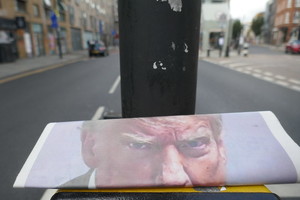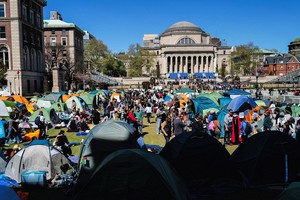Hawaii Wildfires Leave Over 100 Dead, Thousands Displaced

Hawaii is suffering through the aftermath of the deadliest string of wildfires in modern United States history, with over 100 confirmed deaths and thousands of structures destroyed.
Details: In the village of Lahaina on the western side of Maui, thousands of residents are displaced after fires leveled entire neighborhoods. As crews continue to search the impacted areas, some locals are voicing fears that the disaster could permanently displace native residents already struggling to afford housing on the island.
Hawaiian Governor Josh Green (D) condemned land developers and investors for reportedly contacting residents with offers to purchase destroyed property. The governor is pushing for a "moratorium on any sales of properties that have been damaged or destroyed" in order to prevent developers from attempts to "steal land from our people and then build here."
President Joe Biden said he plans to visit Hawaii next week.
How Did the Fires Start? While there is not yet a confirmed cause for the fires' start, in one video a fire is seen starting after a tree fell onto a power line, leading some to blame Hawaii's electric utility equipment.
Across the media spectrum, outlets are citing invasive plant species and irresponsible power grid management as amplifying the fires. Hawaii is currently in its dry season, providing fires with additional kindling and ample conditions to burn rapidly.
Some are pointing to climate change as exacerbating the fires, saying greenhouse gas emissions amplified drought conditions on the islands. Others have questioned this position, instead focusing on inadequate maintenance of Hawaii's ecosystem.
How the Media Covered It: Sources across the spectrum covered the fires, with left- and center-rated outlets highlighting them more prominently. Coverage from left to right often reflected partisan disagreement about climate change and its connection to extreme weather events.
Some left-rated fact check outlets heavily covered and refuted viral theories that the fires were started by 'directed energy weapons.'
Right-rated outlets heavily covered and highlighted criticism of Biden, who reportedly answered "no comment" to a reporter's question about the fires.
More from AllSides
Snippets from the Right
Democrats' climate distraction won’t stop Hawaii wildfires
Washington Examiner (opinion)
"For thousands of years Native Americans used fires to shape wildlife for their own purposes. Only after Europeans settled the West did 'nature' become a sacred resource that had to be kept pristine. If humans don’t actively manage the vegetation that grows near our communities, nature eventually will. But it will be done in a much more fiery and destructive manner than if we had done it ourselves."
Biden slammed for heartless ‘no comment’ response to Maui wildfire, as death toll mounts
New York Post
"An apparent lack of White House focus during natural disasters can morph into major political blowback — as happened following Hurricane Katrina in 2005 when then-President George W. Bush was attacked for praising FEMA’s response amid mounting frustrations over the response. The grim tally in Hawaii — which is expected to rise as search and rescue operations frantically continue — made the inferno the state’s worst-ever natural disaster."
Snippets from the Center
'You're kind of raised to hate tourists': Maui fires fan tensions on Hawaiian island
BBC News
"In the immediate aftermath of the fires, some 46,000 people left the island. The grass field separating the airport from the surrounding highway is now lined with rows upon rows of suddenly surplus rental cars. But thousands did not. Some ignored requests to leave Maui immediately, while others flew in after the fire - decisions that have angered some."
Investors Are Calling Maui Wildfire Victims to Buy Their Hawaii Land
Newsweek
"Victims of the Maui wildfires are reportedly being contacted by investors and realtors attempting to buy their land in Hawaii amid the disaster that has destroyed parts of the island. In an Instagram video posted on Sunday, Kāko'o Haleakalā, an organization focused on preserving lands and native species in Hawaii, warned Maui residents of the calls by investors and realtors."
Snippets from the Left
How Maui’s wildfires became so apocalyptic
Vox (analysis)
"Over the last century or so, humans introduced a variety of nonnative grasses to the state, such as guinea grass, which is often used as feed for livestock. These plants are known to outcompete native grasses, and they grow incredibly quickly after rainfall, which can produce an enormous amount of fuel for wildfires."
Why climate change can't be blamed entirely for the Maui wildfires
ABC News (analysis)
"Although drought contributed to the severity of the fires, anthropogenic climate change is not to blame for Maui's drought conditions either. Drought is not uncommon in Hawaii, which is currently in its dry season. Parts of Maui, including much of the island's west coast, are currently under severe drought, according to the U.S. Drought Monitor."

April 26th, 2024

April 25th, 2024

April 25th, 2024